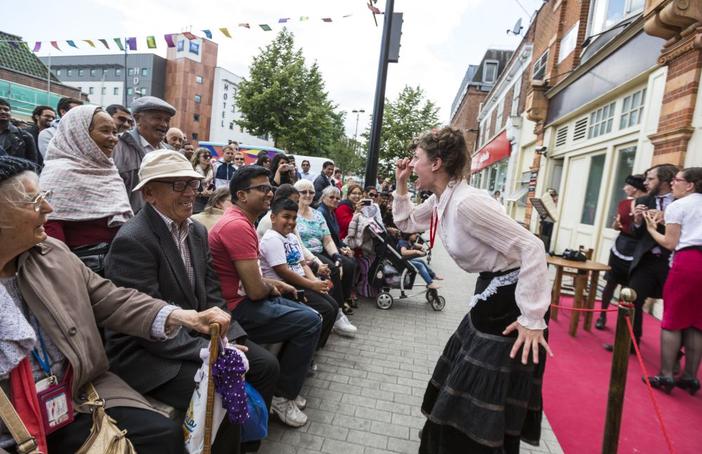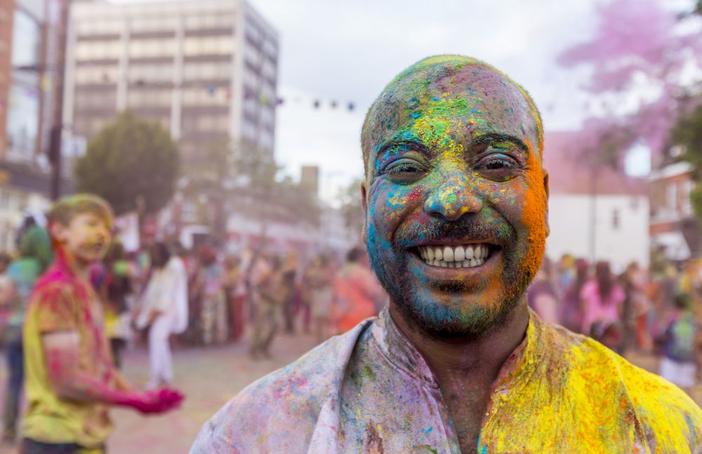Blog Post
Ten top tips: using stewards at outdoor arts events
Jan Lennox from Watermans and Creative People and Places Hounslow shares her top tips on using stewards to build relationships with audiences at outdoor events

The right stewards can make or break an arts event, especially when your audiences are not traditional arts attenders. Jan Lennox from Watermans in Hounslow shares her top tips for creating a friendly and welcoming space.
Watermans is a major arts centre in West London and the lead partner for Creative People and Places Hounslow, with a ten year vision to build a confident, creative and colourful borough.
“We set up a partnership between Watermans and the London Borough of Hounslow to develop a pilot of pop-up events in town centre. The audience feedback was really positive, and suggested an opportunity for development.”
As part of its Creative People and Places programme, and with support from the local authority, Watermans now programmes 20 events a year in Bell Square in the town centre of Hounslow, one of London’s most diverse boroughs.
“Outdoor events often use stewarding companies and the stewards can end up being glorified security and not very helpful, which was absolutely not what we wanted! Trained customer relations staff are more likely to extend their skills and make connections with people in the street.”
With this in mind, Jan shares her top tips for stewarding free outdoor arts events in a friendly and helpful way:
1. Quality is key
We were convinced that the work had to be high quality – we didn’t want to fob off inexperienced audiences with work that wasn’t great, on the basis that if this was a new audience, then if the work is good they will come back! So we programme a wide range of high quality UK and European work.
2. Be welcoming – to everyone
Building an audience in this context requires good strategy and a joined-up approach. A key success factor is breaking down barriers to engagement. Essentially, event stewards need to create a warm and welcoming space, to bring in as many people as possible, to ensure that people feel able to stop and watch the performance, perhaps for the first time ever, or for the first time in a while.
3. Trust your staff...
We use our own customer relations team as stewards, not security people or stewarding companies. Our venue customer relations staff are trained to be welcoming, and we wanted that same ethos, but even more so! They are dealing with the public on the street, not with people who’ve made a choice to come to an arts event in a venue.
4. ...but identify gaps in training
We also recognised that extra training was needed. Each day that there’s an event, we start with a briefing, but as well as going through the usual health and safety, security, traffic management, operational stuff, we emphasised that their role is to create a warm environment.
5. Brief stewards properly
The stewards talk to passersby about events that day – they have to be good at lots of short and snappy explanations. We keep it very basic – there’s nothing that’s hard to understand or using ‘artspeak'. And, of course, it’s all free. We encourage them to come back for performances and, generally speaking, people do.
If you remove the obvious barriers – telling people with young children that it’s suitable for children etc. – then they will come. The programme is designed to be suitable for anybody. There’s nothing text-based because that requires knowledge of a particular language. Hounslow is very diverse and has lots of recent arrivals.
6. Put in the time
We have around 20 events a year, and I reckon we have about 300 chats every time – so that’s 6,000 conversations a year, some short and some really long. We chat about shows, but also about individuals. It’s a really intensive way of doing audience development, but it actually works. There’s an immediate, tangible effect – talk to people and then see them in the audience later. You can see that it’s working!
7. Talk to people after the event too
Afterwards, we try to talk to as many people as possible, to thank them for coming and tell them that we hope they enjoyed it. People are coming back regularly – we have quite a lot of regulars! We have lots of single men, just coming along, which is very unusual in an arts context. A little while before every event, a group of older Nepalese people come – they have no English at all, so we can’t talk to them about it, but they’re there every single time, ready and waiting, which is great.
8. This work is vital
The stewards’ welcome is really important – it’s essentially a role to convert confused or anxious passersby into willing and active audience members. We think a lot about barriers to engagement in the arts, and cost is a big one – people are surprised that our events are free – or people feel that they don’t have the time, or the arts aren’t for them.
The steward role is very much the first person, one-on-one breaking down those barriers. The stewards are always emphasising that the events are free, that everyone is welcome. That includes the whole community – homeless people, non-English speakers, older people, children. The events are in a public space and they have to be genuinely for everybody. We treat absolutely everyone the same.
9. Build it and they will come…
The feedback is basically: we love it, give us more! We thought people would be more critical in the second year, but it they really haven’t been so far. People just love it. And the stewards enjoy the work – they have a really appreciative audience, which is nice. These are often groups of people who are very unlikely to go to mainstream arts events, and the stewards talking to people need to be aware of that. They also need to emphasise that this is an arts space, so that when people see an event they understand that it’s part of the arts, that they have engaged in the arts. It means people start to think, actually I enjoyed that last time, which makes them more likely to engage in another arts event in future.
10. And finally...
The three key things we want staff to remember are that the events are all free, everybody’s welcome, and to smile, smile, smile – it’s as cheesy as you like! The important thing is for the stewards to be as approachable as possible.
You can download this resource below.
Jan Waterman was talking to Eleanor Turney. Images: Vipul Sangoi








